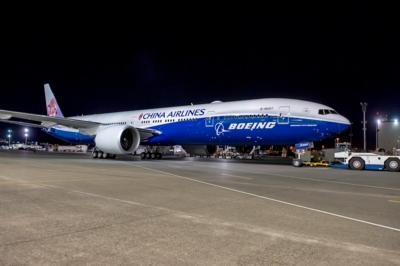Fri, Jun 28, 2024
China’s CAAC Pauses Deliveries to Analyze Revised Cockpit Voice Recorder
Boeing finally got some good news from back east, hearing that Chinese regulators are approving their widebody aircraft for importation again.

That should help them clear out its backlogs of 777 and 787s waiting to be delivered to customers in China, but the 737 Max family remains held up. The widebody Boeings didn't get to enjoy their delivery window for too long, being shut out from 2019 to only a couple weeks before New Year 2024. Only a few months passed until the Civil Aviation Administration of China announced that it would again suspend entry of new Boeing aircraft into the country. Deliveries were apparently halted this time over reviews needed for the 25-hour cockpit voice recorder, and the lithium battery that comes with it.Rumor has it that the 737 Max holdup will be lifted next month, allowing Boeing to clear out dozens of aircraft waiting for delivery to China. So far, since the beginning of the year, Boeing has managed to deliver about two dozen aircraft to Chinese clients, after ending last year with 85 waiting to be shipped out to their eastern clientele.

It's a little odd that the CAAC didn't approve of the new CVR Boeing now ships with its planes. The new unit meets the provision of the recent FAA reauthorization bill that demands all new aircraft come equipped with a cockpit voice recorder boasting a 25-hour retention span. The idea of a 25-hour minimum made its way into European rules a decade prior, but the FAA has only now been granted a mandate to establish its own framework to institute the same. Recent near-hits and mishaps have really driven home the point of longer cockpit recording systems, particularly with the embarrassment surrounding the highly visible Alaska Airlines MAX 9 flight that headlined for months earlier this year. After the aircraft landed, nobody on the ground staff had remembered to pull the breaker for the CVR, meaning the unit overwrote the entirety of the incident flight, losing crucial information and context right as the investigation began.
Other regulators, like the FAA and the EASA had no problem approving it for use, and the track record of duty-spec lithium batteries used in professional (and expensive) American products certainly doesn't give any reason to expect spontaneous combustion. Unfortunately the tight-lipped CAAC doesn't really say much about it to the public, leaving some to wonder whether it really was a simple objection to a new and unapproved battery, or a famously intrusive government making sure their rivals aren't shipping a tattletale system of their own.
More News
During The Forced Landing, The Airplane’s Float Struts And Spreaderbars Collapsed Analysis: While en route to a remote fishing lodge in a float-equipped airplane, one of the >[...]
"X-59 is a symbol of American ingenuity. The American spirit knows no bounds. It's part of our DNA – the desire to go farther, faster, and even quieter than anyone has ever g>[...]
Aero Linx: The Honourable Company of Air Pilots The advancement of the public interest by the promotion of safety for all those who are employed in connection with or who travel by>[...]
Minimum Friction Level The friction level specified in AC 150/5320-12, Measurement, Construction, and Maintenance of Skid Resistant Airport Pavement Surfaces, that represents the m>[...]
Aero Linx: Aerospace Industries Association (AIA) For over 100 years, the American aerospace and defense industry has shaped the world around us. From the first flight to the moon >[...]
 NTSB Final Report: Dehavilland DHC-2 MK 1
NTSB Final Report: Dehavilland DHC-2 MK 1 Aero-News: Quote of the Day (10.29.25)
Aero-News: Quote of the Day (10.29.25) ANN's Daily Aero-Linx (10.29.25)
ANN's Daily Aero-Linx (10.29.25) ANN's Daily Aero-Term (10.30.25): Minimum Friction Level
ANN's Daily Aero-Term (10.30.25): Minimum Friction Level ANN's Daily Aero-Linx (10.30.25)
ANN's Daily Aero-Linx (10.30.25)




